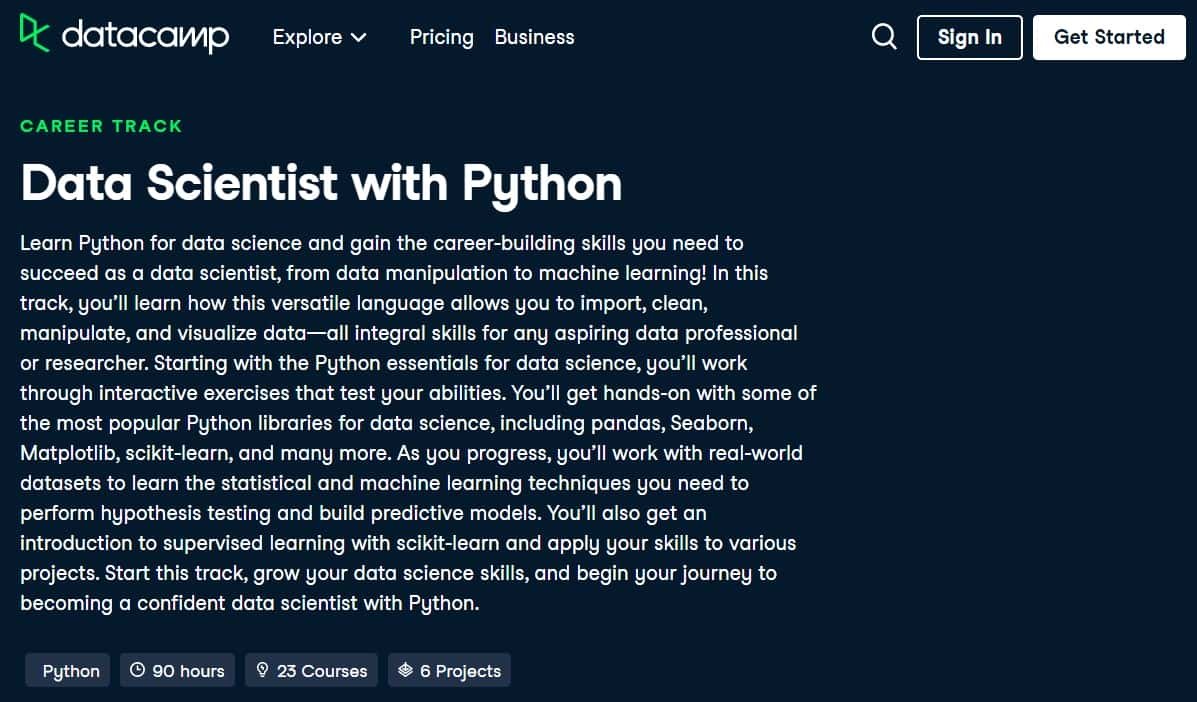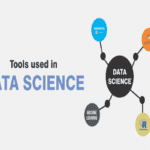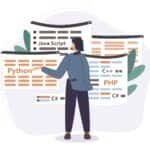With the expanding field of Data Science, the need for efficient and skilled professionals is increasing. You need to be highly proficient in programming languages to help businesses solve problems. Python is one of the widely used programming languages in the world having its own significance and benefits. Its efficacy may allow kids from a young age to learn Python and explore the field of Data Science. Some of the top Data Science courses for Kids with Python have been mentioned in this blog for you. Read below to find out!
Why learn Python for Data Science?
Being one of the most demanding programming languages today, you need to learn Python for Data Science. The reasons that will make you want to learn Python are listed below:
- Flexibility: creativity is the core feature of the Python programming language and if you want to explore your creative skills, then Python is the best option for you. Becoming a developer was never easy and for those who want to script for applications and websites, Python is the most ideal path.
- Easy to learn: as Python focuses on simplicity and readability, it makes it easier for you to learn the programming language. The ease of learning enables you to begin programming with Python as the most ideal tool. It offers you the advantage of using fewer codes to accomplish your tasks compared to older languages.
- Open Source: Python is free and makes use of a community-based model for its development. The Open-source feature of Python is designed specifically to run in the environments of Windows and Linux. It can be easily ported to multiple platforms. Accordingly, there are many Python libraries which are open-source including Data Manipulation, Data Visualisation, Machine Learning, Natural Language Processing, Statistics and Mathematics.
- Well-supported: Python has a large community of followers that includes professionals from the academic and industrial circles which allows them to use the analytics libraries for problem solving. Accordingly, it is possible for the Python users to ask for help from Stack Overflow, mailing lists and user-contributed code and documentation. Moreover, as Python becomes more popular, more users will contribute to the user experiences thus, boosting support material at no cost.
How to Learn Python for Data Science in 5 Steps
In order to learn Python for Data Science, following are the 5 basic steps that you need to follow:
- Learn the Fundamentals of Python: Learn the basic principles of the Python programming language. Factors such as types of data, control flow, looping, functions, and libraries are all topics to understand. These are a few online tutorials, instructions, and books available that can help you with comprehending these basic concepts.
- Gain Practical Experience with Python Libraries: Python has an extensive community of libraries that are frequently utilised in data research. Begin with learning the fundamental packages NumPy (for numerical computing), Pandas (for Data Manipulation and Analysis), and Matplotlib (for Data Visualisation). Perform coding tasks and assignments to get expertise with these libraries.
- Understand Data Science Concepts: Gain a solid foundation on fundamental Data Science concepts such as machine learning, statistical analysis, and Data Visualization. Learn probability, testing for hypotheses, regression, classification, and grouping, among other topics. Data science-specific online courses in mathematics and literature may assist you delve further into these topics.
- Develop your Portfolio: You need to build your portfolio with these foundational skills and expertise. Additionally, be part of Data Science projects involving Data Visualization and Machine Learning that will allow in demonstrating your skills vehemently. Moreover, you need to present your portfolio and analysis in an understandable format for which you can use Jupyter Notebook.
- Explore Machine Learning with Python: Become familiar with prominent Python artificial intelligence libraries such as sci-kit-learn and TensorFlow. Begin by employing algorithms for supervised learning such as linear regression, logistic regression, decision trees, and support vector machines. After that, move towards unsupervised learning methods like clustering and dimensionality reduction. To obtain practical expertise, run the algorithms on datasets.
Required Skills in Data Science
As you grow to learn Data Science and aspirants wanting to progress in the field, you need to excel in several Data Science skills which can be explained as follows:
- Programming skills: you need to excel primarily with your skills in programming languages like Python or R. Data Science with Python skills are essential for ensuring that you secure a solid position in the industry with strong expertise in Python for developing models and automating operations.
- Statistical skills: having a clear idea regarding the procedures of different tasks requires you to have a thorough understanding of statistics. Accordingly, you need to make sense of the data that you derive from the various sources for which knowledge in probability, hypothesis testing, regression analysis is important.
- Data Manipulation and Analysis: your skills in data manipulation is important to ensure that you are able to concisely analyse the data that you have gathered. Consequently, you need to be skilled in cleaning, manipulating, and structuring the data efficiently. You should be skilled in using a variety of tools including SQL and Python libraries like Pandas.
- Machine Learning: Data Science aspirants need to have a good and concise understanding on Machine Learning algorithms including both supervised and unsupervised learning. It includes regression, classification, clustering, decision trees, and more. Proficiency in ML is understood when these are not just present in the aspirant in conceptual ways but also in terms of its applications in solving business problems.
- Data Visualization: The ability to present insights effectively through visualisation of data is an appreciated skill. Tools such as Matplotlib, Seaborn, and Tableau may help you in creating useful visualisations that make challenging data more readily available and understandable to others.
- Big Data Technologies: As the amount of data grows, familiarity with big data technologies such as Apache Hadoop, Apache Spark, and distributed computer platforms might be useful. It is critical for knowing how to work with huge data sets efficiently.
Also Read: How to become a Data Scientist after 10th?
Best Resources to learn Data Science with Python:
1. Pickl.AI:
One of the best Data Science with Python Certification course online is offered by Pickl.AI. The Python for Data Science short-term course will allow you to embark on your coding journey that will transform your career in the most exciting way. Data Science for Kids with Python can be availed by all through Pickl.AI which offers the following features through its course:
- 12.5+ learning hours
- Learn from Industry experts
- Presence of comprehensive learning modules
- 100% support and assistance from the in-house Data Scientists
- An immersive learning experience to transform your career
- Course curriculum designed by the in-house experts of Pickl.AI
- Self-paced learning facilities with affordable fees structure
- Indulge in case studies and program development emphasised from foundational concepts
- Learn from the live projects by the industry experienced professionals
- Learn Coding, Debugging and Programming
- Beginners and Data enthusiasts can avail this course.
- Certification after course completion.
Emphasising on the learner’s ability to grasp knowledge and expand their interest in coding and programming, Data Science for kids with Python ensures to enhance the interests of kids in the field. With development of basic conceptual knowledge in Python, you will find yourself exploring the field of Data Science in the most apprehensive manner.
2. Simplilearn:
The Data Science with Python course offered by Simplilearn provides you with the opportunity to gain complete understanding of Python Data Analytics tools and techniques. As learning Python programming opens doors for multiple opportunities in Data Science roles, availing the course will only enhance your programming skills. The course involves a blended learning approach where you learn not just Python but also other Data Science concepts like Data Wrangling, Mathematical computing and more. The key features of the course are as follows:
- 68 hours of blended learning approach
- Indulge in 4 industry-relevant projects
- Interactive learning facilities using Jupyter Notebooks labs
- Gain access for a lifetime to the course curriculum along with availing a self-paced learning
- Includes a dedicated session of mentoring from the faculty of experts from the industry
- Learn skills including Data Wrangling, Data exploration, Data Visualization and mathematical computing.
- Additional skill development includes web scraping, hypothesis building, python programming concepts, NumPy and SciPy package and Sci-kitLearn package for NLP.
- Certification after course completion
With the job opportunities in Data Science increasing vehemently, taking up the course from Simplilearn will make you ready to become a Data Scientist with Python programming skills. You will also gain advanced skills in Data Science hence, making you an industry expert efficiently.
3. Codered:
Data Science Course for Kids with Python is the course offered by Codered that can help you master the basics of Data Science with hands-on learning experiences. The course is primarily meant for kids and beginners who want to explore their career in Data Science. Taking the course by Codered will enable you to prepare for your future job roles at an early stage and can become key steps in entering Data Science. Through this course, you will learn the following:
- Solve real-world problems like predictive weather or industrial trends
- The importance of becoming a Data Scientist today
- How to make use of Python for Data Science in hands-on exercises?
- Visualising Data in the Let’s Draw section
- Predicting the temperature using Data Science
- Comprehensive curriculum from introduction to Data Science to predictive analysis
- Industry experts and professional instructors guiding through the course.
- 50 premium lessons
- 7 quizzes and assessments for testing
- Certificate after completion
As you step-up to learn Python for Data Science and Machine Learning, the course will enhance your skills in the field from basic level programming to predictive analysis in Data Science. Essentially, being a beginner in the field will allow you to explore the field vehemently and ensure that you have an extensive knowledge with hands-on experiences.
4. Datacamp:
Datacamp offers its Data Scientist with Python course that includes 23 courses to those aspirants willing to start a career in Data Science with experience in Python programming. The Introduction to Python course will help you build your career with skills from data manipulation to machine learning. Essentially, the versatility of Python will be understood throughout the course as you import, clean, manipulate and visualise data. This will allow you to excel in your skills of Data Science to become an industry expert. Following the features of the Data Science course for Kids with Python that will help you learn more about it:
- 4 hours of immersive learning experience
- 11 recorded videos and lectures for enhancing conceptual knowledge
- 57+ exercises that will help kids learn and practise the language
- From Python basics to Python libraries all sections are covered.
- Industrial experts’ guidance and mentorship
- Certificate of completion
The short-term course is a self-paced learning program of 4 hours which will help you expand your skills in programming and explore the field of Data Science effectively. Through the course kids and beginners can excel their skills in Python and move forward on their journey in Data Science.
Conclusion
From the above blog it is clear that there are a variety of Data Science courses for Kids with Python courses in the market. The top 4 courses have been mentioned in the blog which can help you develop your programming skills. Essentially, you can indulge in industry-relevant case studies and projects to have hands-on learning experiences in Python.
FAQs
Can kids learn data science?
Yes, kids, especially teenagers can be the ideal starting age for learning Data Science. If you want to ensure that your kids enter the world of technology and explore their creative skills, a Data Science course for kids with Python definitely will help them develop their skills.
How long will it take to learn Python?
It might take you from two to six months to learn the basics of Python for Data Science and Machine Learning. However, you may be able to start writing your first short program within a few minutes of learning because of the flexible and easy-to-learn feature of Python.
What is the minimum age for a Data Scientist?
The minimum age to start working as a Data Scientist can be considered to be 21+ years. It implies that a person with a graduation degree in any field, preferably STEM and even non-technical field but having certification in Data Science can become a Data Scientist.
Is Python Necessary in the data science field?
You can become a Data Scientist or Analyst even with skills in R and SAS amongst other programming languages ensuring that you use different analytical tools for analysis and visualisation. However, Python being highly user-friendly, open source as well as highly flexible ensures that you have excellence in the field of Data Science.
How Learning Python Can Make Your Child A Data Scientist?
One of the many advantages of Python is that its syntax is very straightforward and allows you to work comfortably and develop models and operations effectively. It’s free resources and community contribution makes it highly flexible and cost-friendly. Because of its accessibility to learn Python from websites like Cyber Square that offers courses in a gamified manner, children of 7 years of age can even understand Python. Therefore, children can progress towards becoming a Data Scientist by learning Python.














![Method Overriding & Method Overloading in Python [with Example]](https://www.pickl.ai/blog/wp-content/uploads/2023/08/Method-Overriding-Method-Overloading-150x150.jpg)